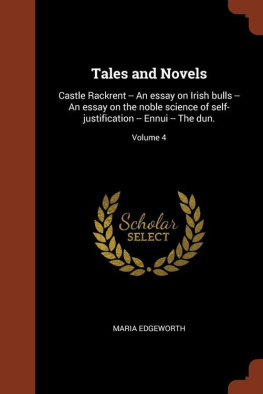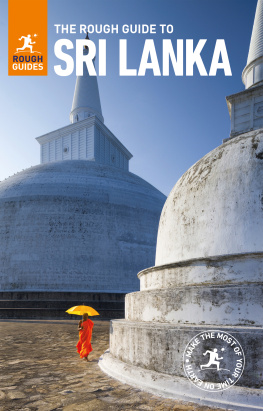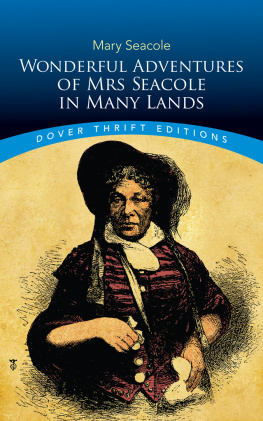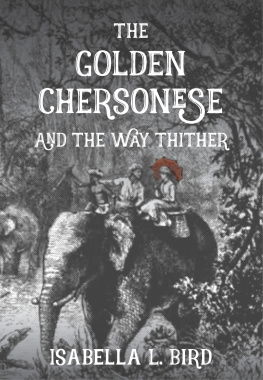Project Gutenberg's Tales And Novels, Volume 4 (of 10), by Maria Edgeworth
This eBook is for the use of anyone anywhere at no cost and with
almost no restrictions whatsoever. You may copy it, give it away or
re-use it under the terms of the Project Gutenberg License included
with this eBook or online at www.gutenberg.org
Title: Tales And Novels, Volume 4 (of 10)
Castle Rackrent; An Essay on Irish Bulls; An Essay on the
Noble Science of Self-Justification; Ennui; and The Dun
Author: Maria Edgeworth
Release Date: December, 2005 [EBook #9439]
This file was first posted on September 30, 2003
Last Updated: December 20, 2016
Language: English
*** START OF THIS PROJECT GUTENBERG EBOOK TALES AND NOVELS, VOLUME 4 (OF 10) ***
Text file produced by Jonathan Ingram, Tapio Riikonen and PG
Distributed Proofreaders
HTML file produced by David Widger
TALES AND NOVELS,
VOLUME IV (of X)
Containing
CASTLE RACKRENT; AN ESSAY ON IRISH BULLS; AN ESSAY ON THE NOBLE SCIENCE OF SELF-JUSTIFICATION; ENNUI; AND THE DUN.
By Maria Edgeworth
In Ten Volumes. With Engravings On Steel.
(Engravings not available in this edition)
1857.
A prudence undeceiving, undeceived,
That nor too little nor too much believed;
That scornd unjust suspicions coward fear,
And without weakness knew to be sincere.
Lord Lytteltons Monody on his Wife.
PREFACE
The prevailing taste of the public for anecdote has been censured and ridiculed by critics who aspire to the character of superior wisdom; but if we consider it in a proper point of view, this taste is an incontestable proof of the good sense and profoundly philosophic temper of the present times. Of the numbers who study, or at least who read history, how few derive any advantage from their labours! The heroes of history are so decked out by the fine fancy of the professed historian; they talk in such measured prose, and act from such sublime or such diabolical motives, that few have sufficient taste, wickedness, or heroism, to sympathize in their fate. Besides, there is much uncertainty even in the best authenticated ancient or modern histories; and that love of truth, which in some minds is innate and immutable, necessarily leads to a love of secret memoirs and private anecdotes. We cannot judge either of the feelings or of the characters of men with perfect accuracy, from their actions or their appearance in public; it is from their careless conversations, their half-finished sentences, that we may hope with the greatest probability of success to discover their real characters. The life of a great or of a little man written by himself, the familiar letters, the diary of any individual published by his friends or by his enemies, after his decease, are esteemed important literary curiosities. We are surely justified, in this eager desire, to collect the most minute facts relative to the domestic lives, not only of the great and good, but even of the worthless and insignificant, since it is only by a comparison of their actual happiness or misery in the privacy of domestic life that we can form a just estimate of the real reward of virtue, or the real punishment of vice. That the great are not as happy as they seem, that the external circumstances of fortune and rank do not constitute felicity, is asserted by every moralist: the historian can seldom, consistently with his dignity, pause to illustrate this truth: it is therefore to the biographer we must have recourse. After we have beheld splendid characters playing their parts on the great theatre of the world, with all the advantages of stage effect and decoration, we anxiously beg to be admitted behind the scenes, that we may take a nearer view of the actors and actresses.
Some may perhaps imagine, that the value of biography depends upon the judgment and taste of the biographer: but on the contrary it may be maintained, that the merits of a biographer are inversely as the extent of his intellectual powers and of his literary talents. A plain unvarnished tale is preferable to the most highly ornamented narrative. Where we see that a man has the power, we may naturally suspect that he has the will to deceive us; and those who are used to literary manufacture know how much is often sacrificed to the rounding of a period, or the pointing of an antithesis.
That the ignorant may have their prejudices as well as the learned cannot be disputed; but we see and despise vulgar errors: we never bow to the authority of him who has no great name to sanction his absurdities. The partiality which blinds a biographer to the defects of his hero, in proportion as it is gross, ceases to be dangerous; but if it be concealed by the appearance of candour, which men of great abilities best know how to assume, it endangers our judgment sometimes, and sometimes our morals. If her grace the Duchess of Newcastle, instead of penning her lords elaborate eulogium, had undertaken to write the life of Savage, we should not have been in any danger of mistaking an idle, ungrateful libertine, for a man of genius and virtue. The talents of a biographer are often fatal to his reader. For these reasons the public often judiciously countenance those who, without sagacity to discriminate character, without elegance of style to relieve the tediousness of narrative, without enlargement of mind to draw any conclusions from the facts they relate, simply pour forth anecdotes, and retail conversations, with all the minute prolixity of a gossip in a country town.
The author of the following Memoirs has upon these grounds fair claims to the public favour and attention; he was an illiterate old steward, whose partiality to the family, in which he was bred and born, must be obvious to the reader. He tells the history of the Rackrent family in his vernacular idiom, and in the full confidence that Sir Patrick, Sir Murtagh, Sir Kit, and Sir Condy Rackrents affairs will be as interesting to all the world as they were to himself. Those who were acquainted with the manners of a certain class of the gentry of Ireland some years ago, will want no evidence of the truth of honest Thadys narrative: to those who are totally unacquainted with Ireland, the following Memoirs will perhaps be scarcely intelligible, or probably they may appear perfectly incredible. For the information of the ignorant English reader, a few notes have been subjoined by the editor, and he had it once in contemplation to translate the language of Thady into plain English; but Thadys idiom is incapable of translation, and, besides, the authenticity of his story would have been more exposed to doubt if it were not told in his own characteristic manner. Several years ago he related to the editor the history of the Rackrent family, and it was with some difficulty that he was persuaded to have it committed to writing; however, his feelings for the honour of the family, as he expressed himself, prevailed over his habitual laziness, and he at length completed the narrative which is now aid before the public.
The editor hopes his readers will observe that these are tales of other times: that the manners depicted in the following pages are not those of the present age: the race of the Rackrents has long since been extinct in Ireland; and the drunken Sir Patrick, the litigious Sir Murtagh, the fighting Sir Kit, and the slovenly Sir Condy, are characters which could no more be met with at present in Ireland, than Squire Western or Parson Trulliber in England. There is a time when individuals can bear to be rallied for their past follies and absurdities, after they have acquired new habits and a new consciousness. Nations, as well as individuals, gradually lose attachment to their identity, and the present generation is amused, rather than offended, by the ridicule that is thrown upon its ancestors.






